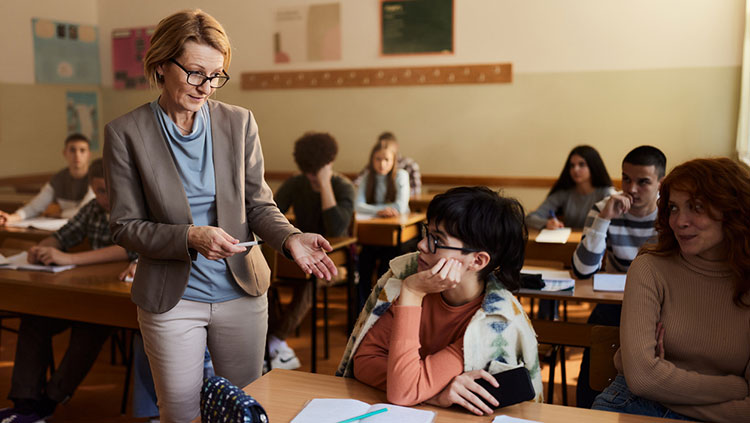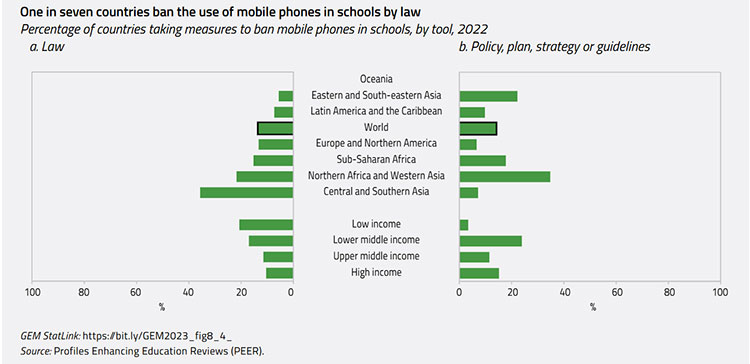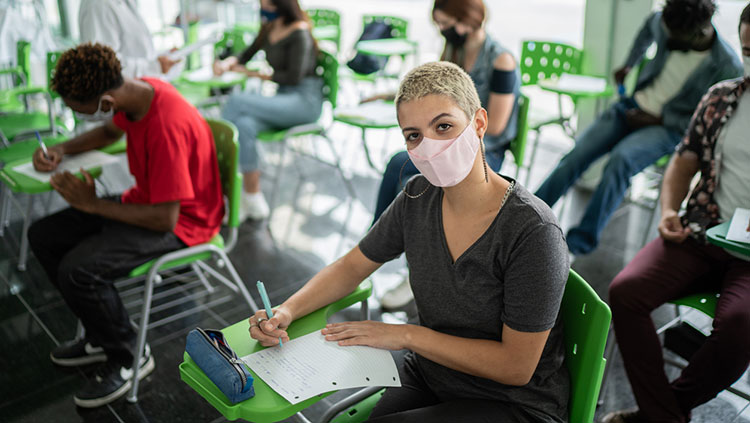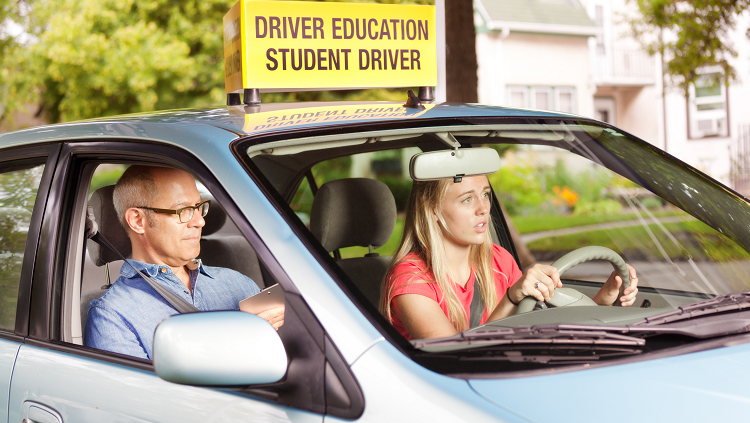Why Are Some U.K. Schools Banning Smartphones in the Classroom?
- Published8 Jan 2025
- Author Catherine Smith
- Source BrainFacts/SfN

In February of 2024, the U.K. government published guidance supporting a ban on smartphone use in schools across England.
This move follows a global trend: A small but growing number of countries have implemented full or partial bans on mobile phone use in schools.
The science driving these bans suggests excessive smartphone and internet use is associated with cognitive costs for students, such as impaired attention, focus, sleep, mental health, and active thinking. But, while research does show several benefits to limiting students’ phone use, some advise against a total ban, fearing blanket bans could have other negative impacts on students’ social interactions, learning opportunities, and mental health.
Why Are Countries Banning Phones in Schools?
“We know that phones can be a distraction — just the presence of a phone in front of you, even if you are not using it, can be distracting,” said Michael S. C. Thomas, Director of the Centre for Educational Neuroscience at Birkbeck University of London. “And this is just as likely to hold in the classroom.”
Conversations surrounding phone use in the classroom have gone global. In July of 2023, UNESCO’s Global Educational Monitoring (GEM) Report, Technology in Education: On Whose Terms, studied 200 country profiles and investigated the impacts of technology, including smartphone use, within educational settings.

The report’s findings concluded that such technologies “can improve some types of learning in some contexts” but can have a “detrimental impact if inappropriate and excessive.” Their evidence suggested excessive phone and computer use distracts students from learning, affects their ability to focus, and is negatively linked with academic performance.
Phones were also found to raise issues around student well-being and safeguarding from online harms, such as exposure to inappropriate or violent content and bullying. The findings led the UN agency to call for schools around the world to ban smartphones in the classroom.
“Pretty much everyone agrees that it’s a bad idea to let pupils have their phones switched on during lessons,” said Max Davie, a consultant pediatrician and former Officer for Health Promotion for the Royal College of Paediatrics and Child Health (RCPCH).
In 2019, Davie helped develop a guide from the RCPCH informing the U.K.’s phone ban policy. The guide’s construction was based on research into 940 individual studies and 12 systemic reviews on screen time and children’s health. He and his collaborators found children with more than two hours of screen time per day tended to display more depressive symptoms, have higher food intake, and poorer diets.
The U.K. guidance to ban smartphones in the classroom was supported by findings from UNESCO and other U.K.-specific evidence and data relating to screen time, internet use, children’s health, and education. The guidance ultimately concluded that “the harms of screen time and social media use significantly outweigh the benefits for young children” whereas certain digital technologies can have benefits for older children.
Beginning to Map Smartphones’ Influence on Teen Brains
A study published in 2019 estimated one in four children and young people exhibited signs of "smartphone addiction" or problematic smartphone use — generally defined by excessive smartphone use in daily life accompanied by substance use disorder-like symptoms. But scientists are only starting to scratch the surface of how problematic smartphone use shapes adolescent brains.
One 2020 study in Frontiers in Human Neuroscience explored the correlations between adolescent smartphone dependence and changes to brain regions associated with addiction. Nineteen teens between 14-18 years old were asked to complete self-assessments of their smartphone dependence, depressive symptoms, and sleep problems. All 19 then underwent diffusion MRI imaging — a type of brain imaging which observes how water diffuses around axons to map out neural connections.
Researchers looked at brain areas traditionally associated with addiction like the nucleus accumbens, anterior cingulate cortex, and amygdala. The results mapped out these regions and confirmed previous research, linking adolescent smartphone dependence with a stronger weight of neural connections in the right amygdala, an area central in emotional learning. The researchers suggested the brain region could become over-sensitized with repeated smartphone use — which could contribute to teens’ desire to continually access their phones.
A 2024 review in PLOS Mental Health looked across 12 studies between 2013-2023 involving around 250 adolescents aged 10-19 with internet addiction. Internet addiction is an inability to resist the urge to access the internet, leading to negative effects on psychological well-being as well as their social, academic, and professional lives.
The studies in this investigation used fMRI scans to inspect connectivity between various brain networks and see how these altered connections may impact development. They found adolescents with internet addiction had a notable decrease in connectivity in the executive control network: parts of the brain used for executive function. These changes influence networks already changing during teen development and were similar to those seen in people with gambling and substance use disorders.
Another 2024 review from Neuroscience and Biobehavioral Reviews compared fMRI studies on internet or smartphone addiction in adolescents. Researchers found correlations between adolescents with internet or smartphone addiction and impairments in executive function- and reward-related regions of the brain. However, researchers could not determine how problematic internet or smartphone use may alter the brain.
Despite the similarities between internet addiction and problematic smartphone use, researchers suggest distinguishing between the two, as they can differ between how they develop and persist. Meanwhile, others debate whether problematic smartphone use should be considered an addiction at all — or whether its medicalization would provide value for combatting the issue.
With uncertainty over diagnostic criteria, a lack of standardized terminology, and a need for more long-term studies, it’s not yet clear how problematic smartphone use results in neural changes in adolescents or if those changes are long term.
Mixed Reactions on Phone Bans in the Classroom
Sam*, a U.K. teacher with 15 years of experience, shared her mixed feelings about the guidelines. “Students use mobile phones for many of the wrong reasons,” Sam said. While admitting that phones can be distracting, she wasn’t sure banning phones was the best solution. “Banning phones … means students never learn the power of the technologies at their fingertips and are not given an opportunity to learn how and when it is appropriate.”
Davie believes completely banning phones in schools is a missed opportunity for social support. “There is no evidence that socializing with the people you happen to share a school class with is more beneficial than checking in with friends who, although they may not share the same physical space, are likely far more supportive, especially for vulnerable children.”
“Moderating the amount and timing of phone use seems the best first step,” Thomas, the Birkbeck University professor, said. And to him, there may be a middle ground for restricting phone use during school. “The opportunity is for children to use these [phones] in schools, but in some sort of ‘Education Mode,’ analogous to the Airplane Mode we activate on flights.”
“Such a mode used throughout the day would only give access to approved educational software to support learning. But this requires governments to engage with commercial providers of phone operating systems,” Thomas said. “In absence of such engagement, the trajectory of travel appears to be towards banning phones at school.”
*Sam requested we only use her first name.
CONTENT PROVIDED BY
BrainFacts/SfN
References
Abrahamsson, S. (2024). Analysis of phone bans in Norwegian schools and their effects on student grades and well-being. NHH Dept. of Economics Discussion Paper No. 01, Available on the Social Science Research Network (SSRN): http://dx.doi.org/10.2139/ssrn.4735240
Abrahamsson, S. (2024). Smartphone Bans, Student Outcomes and Mental Health. NHH Dept. of Economics Discussion Paper No. 01, Available on the Social Science Research Network (SSRN: http://dx.doi.org/10.2139/ssrn.4735240
Active Thinking: Turning the Brain on for Better Grades. (2011). Oxford Learning. https://www.oxfordlearning.com/active-thinking-turning-the-brain-on-for-better-grades/
Adelhardt, Z., Markus, S., and Eberle, T. (2018). Teenagers' Reaction on the Long-Lasting Separation from Smartphones, Anxiety and Fear of Missing Out. Proceedings of the 9th International Conference on Social Media and Society, 212–216. Association for Computing Machinery. https://doi.org/10.1145/3217804.3217914
Ahmed, R. (2024). Parents in Wales campaign to ban smartphones in schools. Wales Online. https://www.walesonline.co.uk/news/education/parents-wales-campaign-ban-smartphones-29527813
An estimated 1 in 4 children and young people have problematic smartphone usage. (2019). King's College London. (2023). King’s College London News. https://www.kcl.ac.uk/news/an-estimated-1-in-4-children-and-young-people-have-problematic-smartphone-usage
Bourke-Taylor, H., O'Brien, T., & Kennedy-Behr, A. (2022). Mental health outcomes of adolescents across Europe. European Child & Adolescent Psychiatry, 31(9), 1357-1368. https://doi.org/10.1007/s00787-022-02012-8
Brain basics: Understanding sleep. (2024). National Institute of Neurological Disorders and Stroke. https://www.ninds.nih.gov/health-information/public-education/brain-basics/brain-basics-understanding-sleep
Busch, P. A., & McCarthy, S. (2021). Antecedents and consequences of problematic smartphone use: A systematic literature review of an emerging research area. Computers in Human Behavior, 114, 106414. https://doi.org/10.1016/j.chb.2020.106414
Carbonaro, G. (2023). UNESCO calls for schools around the world to ban smartphones in the classroom. Euronews. https://www.euronews.com/health/2023/07/26/unesco-calls-for-schools-around-the-world-to-ban-smartphones-in-the-classroom
Chang, M. L. Y., Lee, I. O. (2024). Functional connectivity changes in the brain of adolescents with internet addiction: A systematic literature review of imaging studies. PLOS Mental Health. 1(1): e0000022. https://doi.org/10.1371/journal.pmen.0000022
Children's Commissioner for England. (2018). Written evidence submitted by Common Sense (SMH0135). House of Commons. https://committees.parliament.uk/writtenevidence/89016/html/
Crisp, J. (2023). Finland to ban mobile phones in classrooms to boost exam results. The Telegraph. https://www.telegraph.co.uk/world-news/2023/06/27/finland-ban-mobile-phones-classrooms-boost-exam-results/
de Souza, R. (2022). Digital childhoods: A survey of children and parents. Children's Commissioner for England. https://assets.childrenscommissioner.gov.uk/wpuploads/2022/09/cc-digital-childhoods-a-survey-of-children-and-parents.pdf
de Souza, R. (2023). ‘A lot of it is actually just abuse:’ Young people and pornography. Children's Commissioner for England. https://assets.childrenscommissioner.gov.uk/wpuploads/2023/02/cc-a-lot-of-it-is-actually-just-abuse-young-people-and-pornography-updated.pdf
Department for Education. (2024). Government launches crackdown on mobile phones in schools. GOV.UK. Government Digital Service. https://www.gov.uk/government/news/government-launches-crackdown-on-mobile-phones-in-schools
Gomes, M. (2023). Five reasons to take a break from screens. Greater Good Science Center. https://greatergood.berkeley.edu/article/item/five_reasons_to_take_a_break_from_screens
Haidt, J. (2024). How the Great Rewiring of Childhood is Causing an Epidemic of Mental Illness. Penguin Publishing Group. https://jonathanhaidt.com/anxious-generation/
In case of emergency: New survey finds why parents say children should have their cell phone at school. (2024, September 6). National Parents Union.https://nationalparentsunion.org/2024/09/06/in-case-of-emergency-new-survey-finds-why-parents-parents-say-children-should-have-their-cell-phone-at-school/
Ledsom, A. (2019). The Mobile Phone Ban in French Schools, One Year On. Would it Work Elsewhere? Forbes. https://www.forbes.com/sites/alexledsom/2019/08/30/the-mobile-phone-ban-in-french-schools-one-year-on-would-it-work-elsewhere/
León Méndez, M., Padrón, I., Fumero, A., & Marrero, R. J. (2024). Effects of internet and smartphone addiction on cognitive control in adolescents and young adults: A systematic review of fMRI studies. Neuroscience and biobehavioral reviews, 159, 105572. https://doi.org/10.1016/j.neubiorev.2024.105572
Meijer, B. (2023). Mobile phones and other devices to be banned from Dutch classrooms. Reuters. https://www.reuters.com/world/europe/mobile-phones-be-banned-dutch-classrooms-next-year-2023-07-04/
New guidance to limit phone use in NI schools. (2024). Northern Ireland to follow the UK in banning smartphones in schools. BBC News. https://www.bbc.co.uk/news/articles/c785qx6nvg3o
O’Brien, C. (2024). Mobile phones set to be banned across all second-level schools under new Government plans. The Irish Times. https://www.irishtimes.com/ireland/education/2024/08/21/minister-plans-mobile-phone-ban-across-second-level-schools/
Phillips, S., Mansfield, I., Webb, N. (2022). Disconnect: The case for new digital policy to safeguard children. Policy Exchange. https://policyexchange.org.uk/publication/disconnect/
Positively online. (n.d.). National Society for the Prevention of Cruelty to Children. https://www.nspcc.org.uk/keeping-children-safe/online-safety/online-wellbeing/positively-online/
Robinson, A., & Wood, P. (2023). Not quite a blanket ban on mobile phones in schools: DfE guidance insights. Browne Jacobson. https://www.brownejacobson.com/insights/not-quite-a-blanket-ban-on-mobile-phones-in-schools
Sohn, S. Y., Rees, P., Wildridge, B., Kalk, N. J., & Carter, B. (2019). Prevalence of problematic smartphone usage and associated mental health outcomes amongst children and young people: a systematic review, meta-analysis and GRADE of the evidence. BMC psychiatry, 19(1), 356. https://doi.org/10.1186/s12888-019-2350-x
Smartphones and Social Media Harms. (n.d.). Safe Screens. https://safescreens.org/smartphones-and-social-media-harms/
Tymofiyeva, O., Yuan, J. P., Kidambi, R., Huang, C. Y., Henje, E., Rubinstein, M. L., Jariwala, N., Max, J. E., Yang, T. T., & Xu, D. (2020). Neural Correlates of Smartphone Dependence in Adolescents. Frontiers in human neuroscience, 14, 564629. https://doi.org/10.3389/fnhum.2020.564629
Unveiling the impact of digital technologies on adolescent mental health. (2023). Study of Cognition, Adolescents and Mobile Phones (SCAMP) Study. https://scampstudy.org/news/un
Villegas, S. (2024, August 15). Scotland to introduce mobile phone ban in schools by 2024. Holyrood. https://www.holyrood.com/news/view,scottish-government-announces-new-guidance-on-mobile-phone-use-in-schools
Yang, J., Fu, X., Liao, X., & Li, Y. (2020). Association of problematic smartphone use with poor sleep quality, depression, and anxiety: A systematic review and meta-analysis. Psychiatry research, 284, 112686. https://doi.org/10.1016/j.psychres.2019.112686
What to Read Next
Also In Childhood & Adolescence
Trending
Popular articles on BrainFacts.org



















